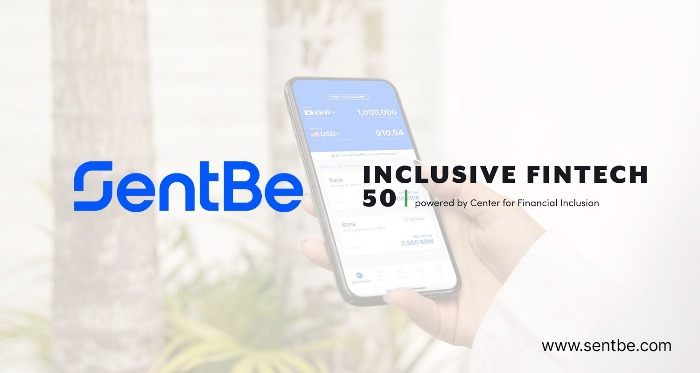Korean startups
SentBe, back from brink of collapse to play in major league
The South Korean cross-border remittance app operator aims to become Asia’s top player by 2025
By Mar 08, 2023 (Gmt+09:00)
3
Min read
Most Read
LG Chem to sell water filter business to Glenwood PE for $692 million


KT&G eyes overseas M&A after rejecting activist fund's offer


Kyobo Life poised to buy Japan’s SBI Group-owned savings bank


StockX in merger talks with Naver’s online reseller Kream


Meritz backs half of ex-manager’s $210 mn hedge fund



SentBe, a South Korean fintech startup operating a personal international remittance app of the same name, is readying to play in the bigger global arena after years of ups and downs, with a vision to lead the Asian remittance market in 2025, which marks the 10th anniversary of its foundation.
“Foreign currency remittance fintech is not an easy concept to grasp. To make things worse, our service faced so many regulations, making it unpopular among venture capitalists,” said SentBe Chief Executive Officer (CEO) Choi Seong-ouk, recalling the early stages of the company’s launch in a recent interview with The Korea Economic Daily. “But those challenges paved the way for the growth.”
Choi founded SentBe in 2015 to offer cheaper and faster remittance services for individuals and businesses after viewing the uneven playing field of the foreign exchange market, where he used to work as an FX broker.
But Korea’s strict regulations made it hard for SentBe to do business, Choi said. The company needed revisions in the country’s Foreign Exchange Transactions Act to allow fintech startups to offer cross-border remittance services like commercial banks, as well as the Venture Investment Promotion Act to enable venture capitalists to invest in financial companies.
The company teetered on the verge of shutdown without proper investment but finally seized a chance for takeoff with most regulation hurdles removed in 2019.
KOREA'S NO.1 TO ASIA'S NO.1
SentBe is now leading the Korean remittance app market partly thanks to its proprietary Automated FX Hedging System (AHS) that minimizes foreign exchange risk through currency hedging. This technology ensures lower fees for SentBe’s remittance services compared with peer services, according to the company.
SentBe is also the only Korean fintech company with its own Legal & Compliance (L&C) team of local and offshore lawyers who manage FX risk, said the company.

Now individuals and businesses in Korea can send their money to 50 countries via SentBe’s money transfer apps – SentBe for personal transfers and SentBiz for the business-to-business (B2B) service.
Its gross merchandise volume (GMV) and revenue have steadily increased, and its users have saved about 180 billion won ($136.3 million) by transferring money via SentBe, according to the company.
SentBe in January advanced into the US, its fourth market following Korea, Indonesia and Singapore. The US is the world’s largest outbound remittance market with $72.7 billion in personal cross-border remittance in 2021, according to the World Bank.
“We are finally playing in the major league,” said Choi.
SentBe will strive to lead the wire transfer service between the US and Asia, especially Korea and Southeast Asian countries. To meet this goal, it plans to introduce a B2B remittance service in the US later this year.
SentBe’s next goal is to become the No. 1 international remittance app in Asia by 2025 to rival bigger global peers like Wise or WorldRemit.
Wise operates multi-currency accounts for personal and business customers to allow more than 50 currencies to be transferred across over 80 countries with the mid-market exchange rate. WorldRemit is also available in 100 countries.
“We will develop new services that can compete neck and neck with global players,” said Choi.
STILL A TOUGH MARKET FOR FINTECH

Despite a few amendments in the country’s laws, Choi said surviving in the Korean fintech market is tough, citing still strict regulations.
According to global technology market tracker CB Insights, fintech startups accounted for 21% of 1,200 global unicorn startups, valued at $1 billion or more, as of October 2022. But Toss by Viva Republica is the only Korean fintech unicorn.
Choi urged novice fintech entrepreneurs to fully understand regulations in the local financial market and venture capital market if they want to succeed. “Do not rely on the government for interpretation of the regulations,” said Choi.
Write to Da Eun Choi at max@hankyung.com
Sookyung Seo edited this article.
More to Read
-
 FintechSouth Korea doubles gov't fintech innovation fund to $781 million
FintechSouth Korea doubles gov't fintech innovation fund to $781 millionDec 26, 2022 (Gmt+09:00)
1 Min read -

-
 Mergers & AcquisitionsKorea’s Toss operator invests $5 mn in US startup fintech platform Republic
Mergers & AcquisitionsKorea’s Toss operator invests $5 mn in US startup fintech platform RepublicNov 24, 2021 (Gmt+09:00)
2 Min read -
 FintechToss en route to being Korea’s first fintech decacorn; valuation tops $7 bn
FintechToss en route to being Korea’s first fintech decacorn; valuation tops $7 bnJun 23, 2021 (Gmt+09:00)
2 Min read
Comment 0
LOG IN


